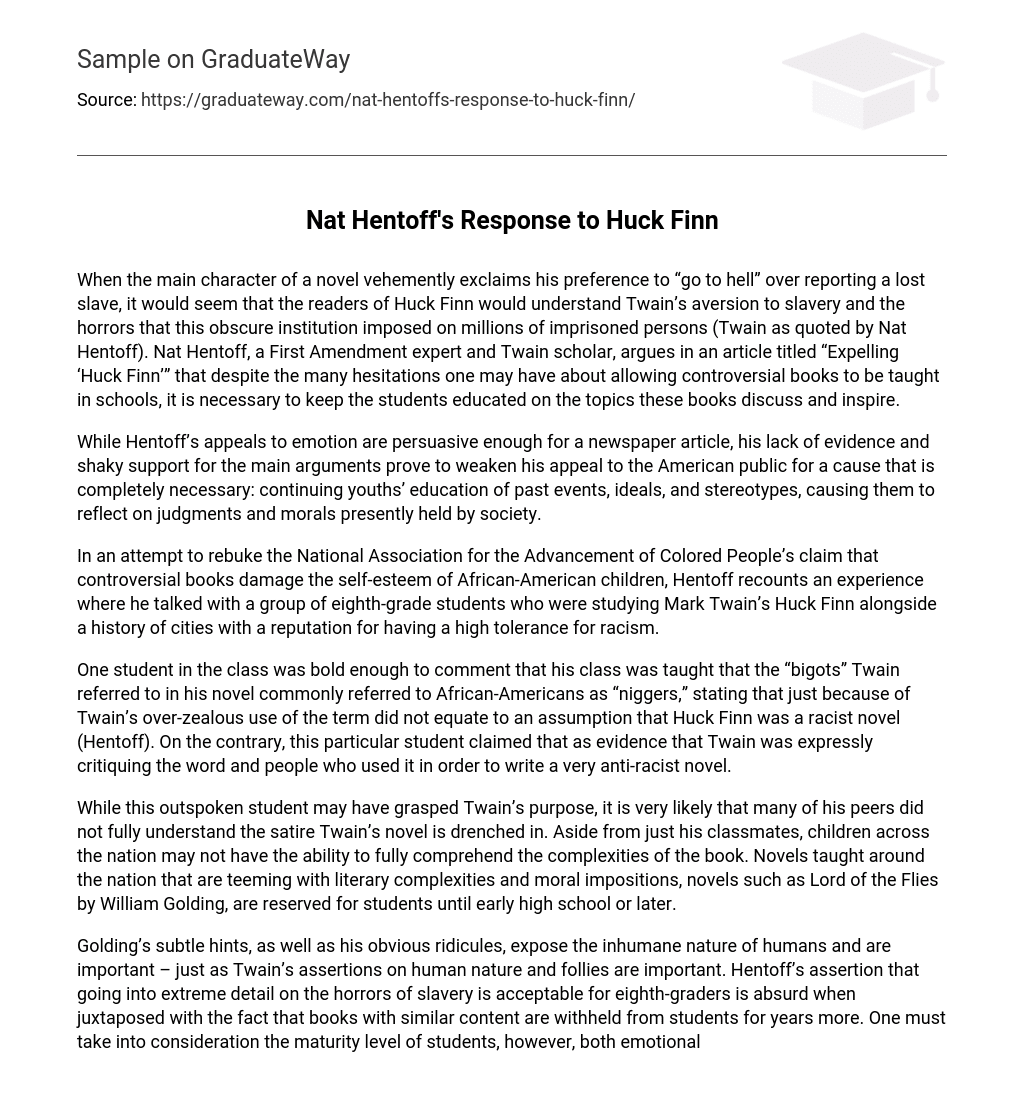According to Nat Hentoff, an expert on the First Amendment and a scholar of Twain, readers of Huck Finn can grasp Twain’s opposition to slavery and its resulting suffering. In his article “Expelling ‘Huck Finn’,” Hentoff argues that despite concerns about teaching controversial books in schools, it is crucial to educate students about the topics these books tackle and foster dialogue. Twain’s protagonist boldly announces their preference to “go to hell” instead of betraying a runaway slave, bringing attention to the atrocities inflicted by this system that impacted countless individuals.
Despite Hentoff’s emotional appeals being compelling in the context of a newspaper article, his lack of evidence and weak support for the central arguments undermine his appeal to the American public. This is problematic because it is crucial to continue educating young people about historical events, ideals, and stereotypes in order to prompt reflection on society’s current judgments and morals.
Attempting to refute the National Association for the Advancement of Colored People’s assertion that controversial books harm the self-esteem of African-American children, Hentoff shares an encounter he had with a group of eighth-grade students. These students were studying Mark Twain’s Huck Finn alongside a history of cities known for their enduring acceptance of racism.
One student in the class argued that despite the frequent use of the term “niggers” by Twain in his novel, it does not make “Huck Finn” a racist book. According to this student, Twain was actually critiquing the word and those who used it, making the novel anti-racist (Hentoff).
While this forthright student may have understood Twain’s intention, it is probable that many of his fellow students did not fully grasp the subtle irony that saturates Twain’s novel. Moreover, children throughout the country might lack the capacity to fully comprehend the intricate aspects of the book. Novels with intricate literary elements and moral implications, such as William Golding’s Lord of the Flies, are typically reserved for students in early high school or beyond and taught nationwide.
Golding’s subtle hints and obvious ridicules reveal the inhumane nature of humans and are significant, similar to Twain’s commentary on human nature and follies. Hentoff’s claim that providing extensive details about the horrors of slavery is appropriate for eighth-graders is absurd when compared to the withholding of books with similar content from students for many more years. Nonetheless, it is crucial to consider the emotional and mental maturity levels of students when determining the appropriate timing for allowing the book.
In regards to Huck Finn, Hentoff suggests that the concept proposed, where eighth grade students are fully developed, may not be plausible. Thus, it becomes necessary to delay the novel’s inclusion in the curriculum until later in their high school education. Hentoff’s entire article is built upon the notion that Huck Finn is easily understandable even for pre-teens, and he supports this by citing various derogatory terms used to describe the white characters in Twain’s book. These adjectives, such as “drunkards,” “liars,” “frauds,” and “hypocrites,” are typical characteristics attributed to villains in novels, which no one would want to be associated with.
Rather than simply being liars or drunks, Hentoff suggests that there are individuals who exceed the evilness of the classical villain, such as “Lynchers, abusers, […and] traders” (Baker, as mentioned by Hentoff). These characteristics are commonly associated with the Caucasian race, evoking memories of America’s dark history and causing readers to recoil at the idea of an entire race being denied their human rights.
These names evoke a longing for a better future, one without inequality and hatred. It is through learning from past mistakes that this future becomes possible. Hentoff uses these names to tap into the reader’s emotions and emphasize that Huck Finn serves as a means to explore, portray, and criticize the tragedies of the past.
While this argument may convince certain readers, it is not a rational method to defend the reasons why Huck Finn should continue to be taught in schools. This diminishes Hentoff’s point. Hentoff mentions a specific incident involving the 1998 Ninth Circuit Court of Appeals and a lawsuit filed by an African American parent/teacher who wanted to remove Huck Finn from reading lists in Arizona schools. The NAACP backed this action as a last attempt to garner support from the reader.
Judge Reinhart believes that Hentoff presents a more convincing strategy. Rather than analyzing and assessing the merits of both sides of the argument, Hentoff proposes that if individuals were to engage in critical thinking about racial slurs in Mark Twain’s novel, the negative impact of those words would be reduced.
Instead of being seen as a way to promote equality, these words would be considered a tool instead. Hentoff’s plea for evidence and analytical thinking is once again overshadowed by his appeal to emotion. The inclusion of Mark Twain’s book Huck Finn in school curriculums is often done to expose the horrors that were common during the time of slavery. Because of the controversial content of the novel, some people have suggested removing it from reading lists.
According to Nat Hentoff, while some people believe that other books can also showcase the horrors described in the novel, he argues that the novel’s ability is unmatched and it should remain a part of the reading list. However, Hentoff’s approach of mainly appealing to readers’ emotions may not be as effective as appealing to their logic and reason.
Works Cited
Hentoff, Nat. “NAACP Wants Huck Finn Expelled.” www.sinc.sunysb.edu/Class/pol_325/Huck.htm. November 27, 1999. Web: August 26, 2010.





